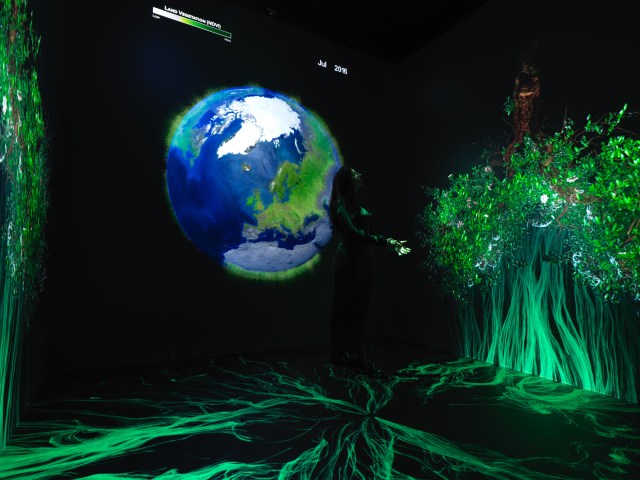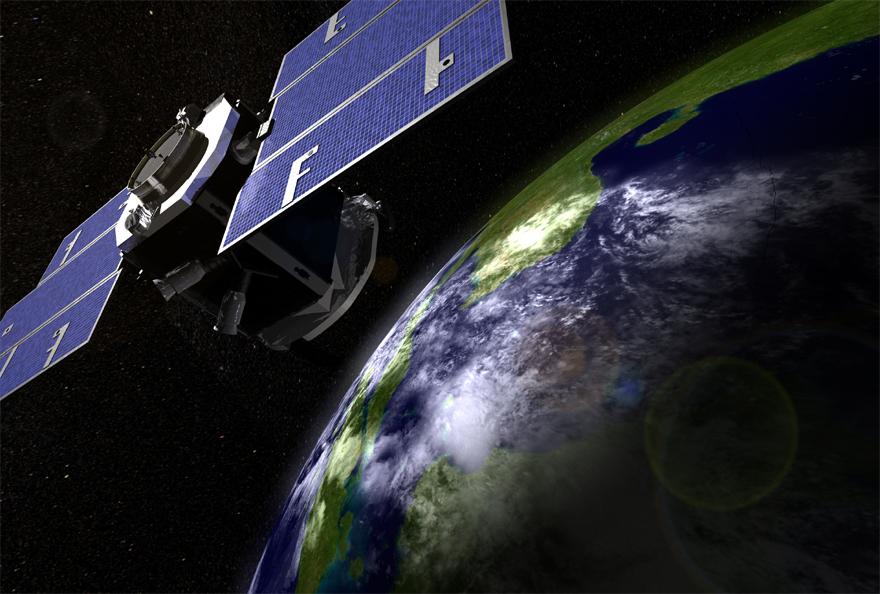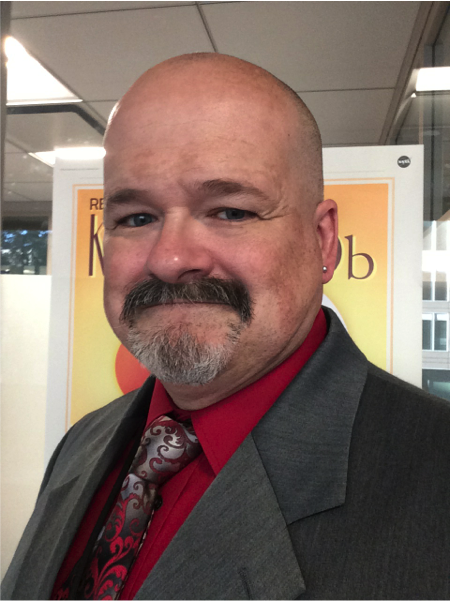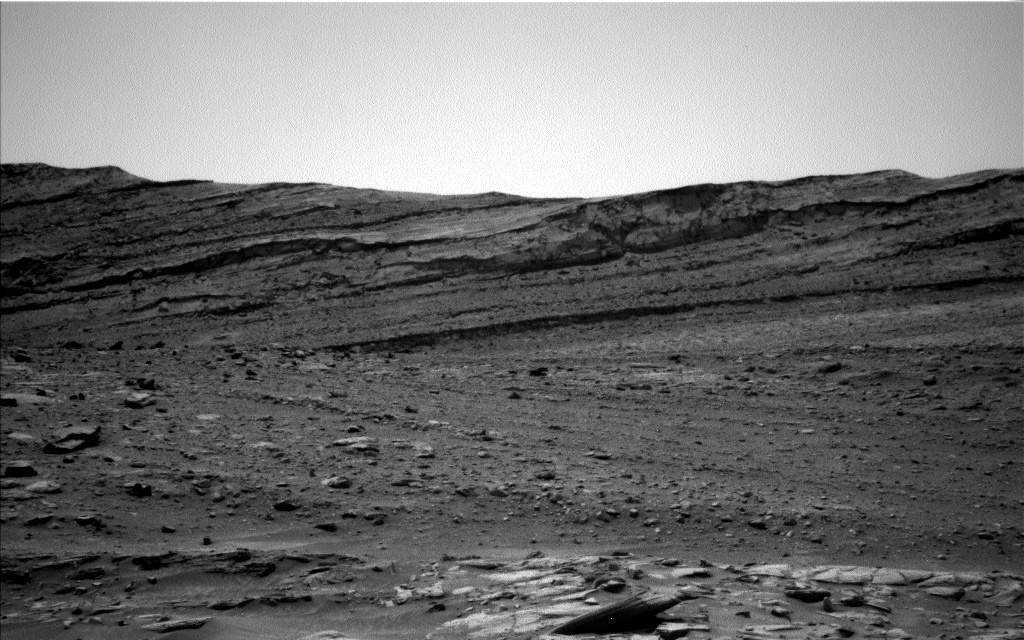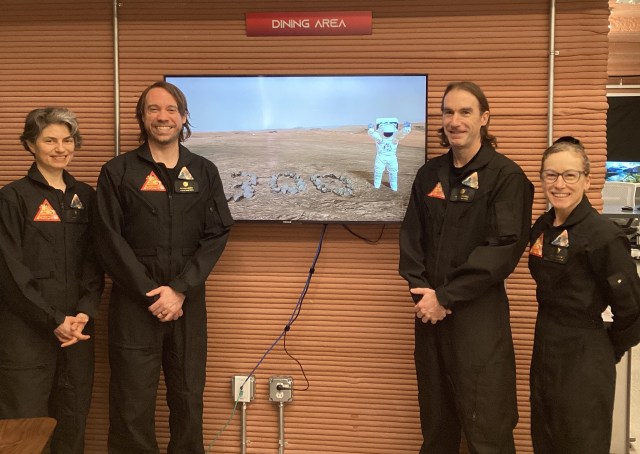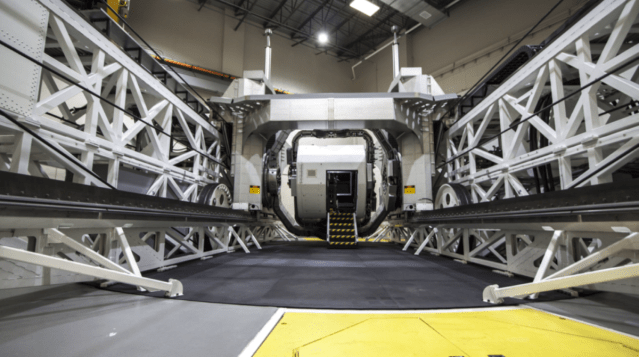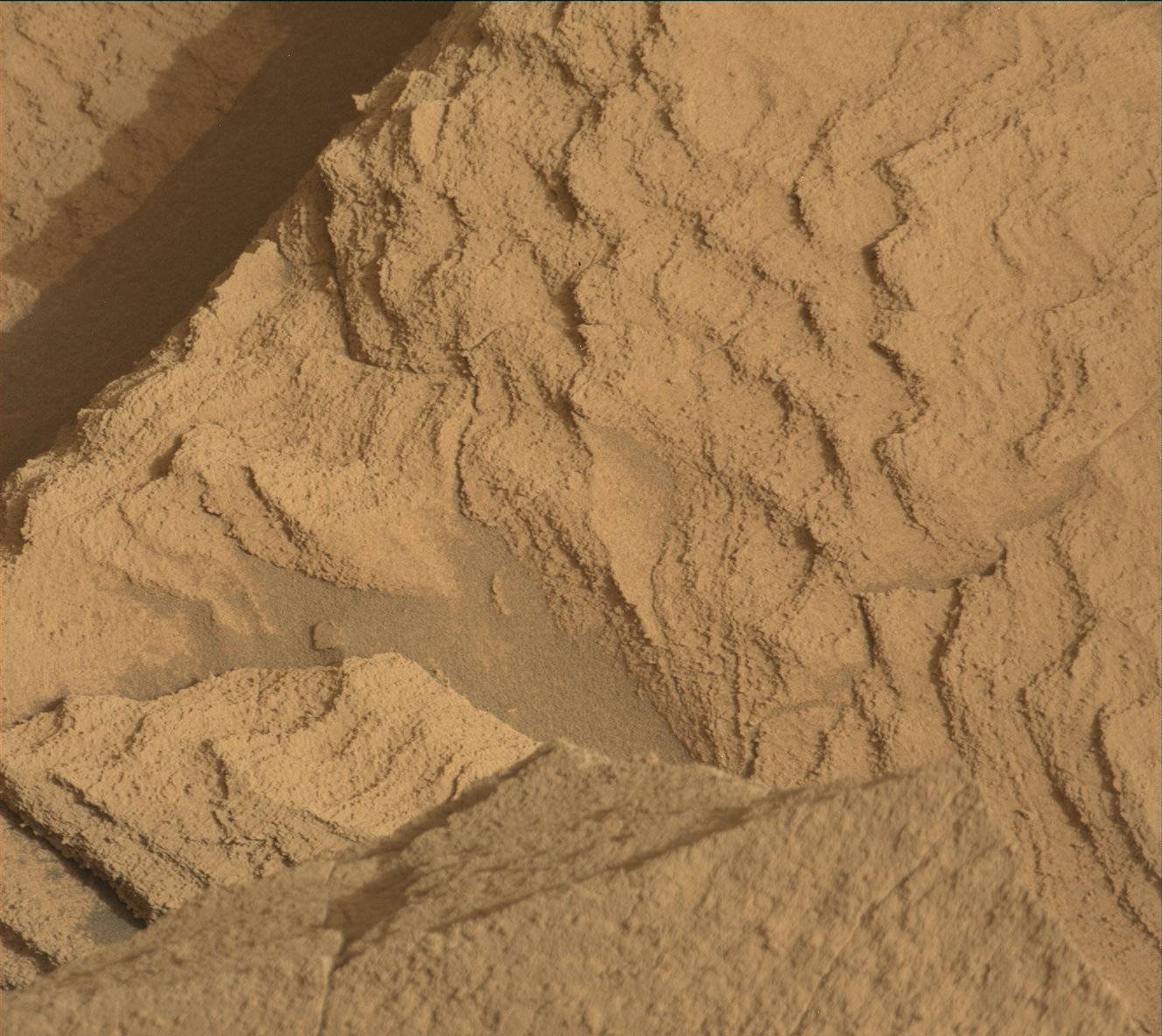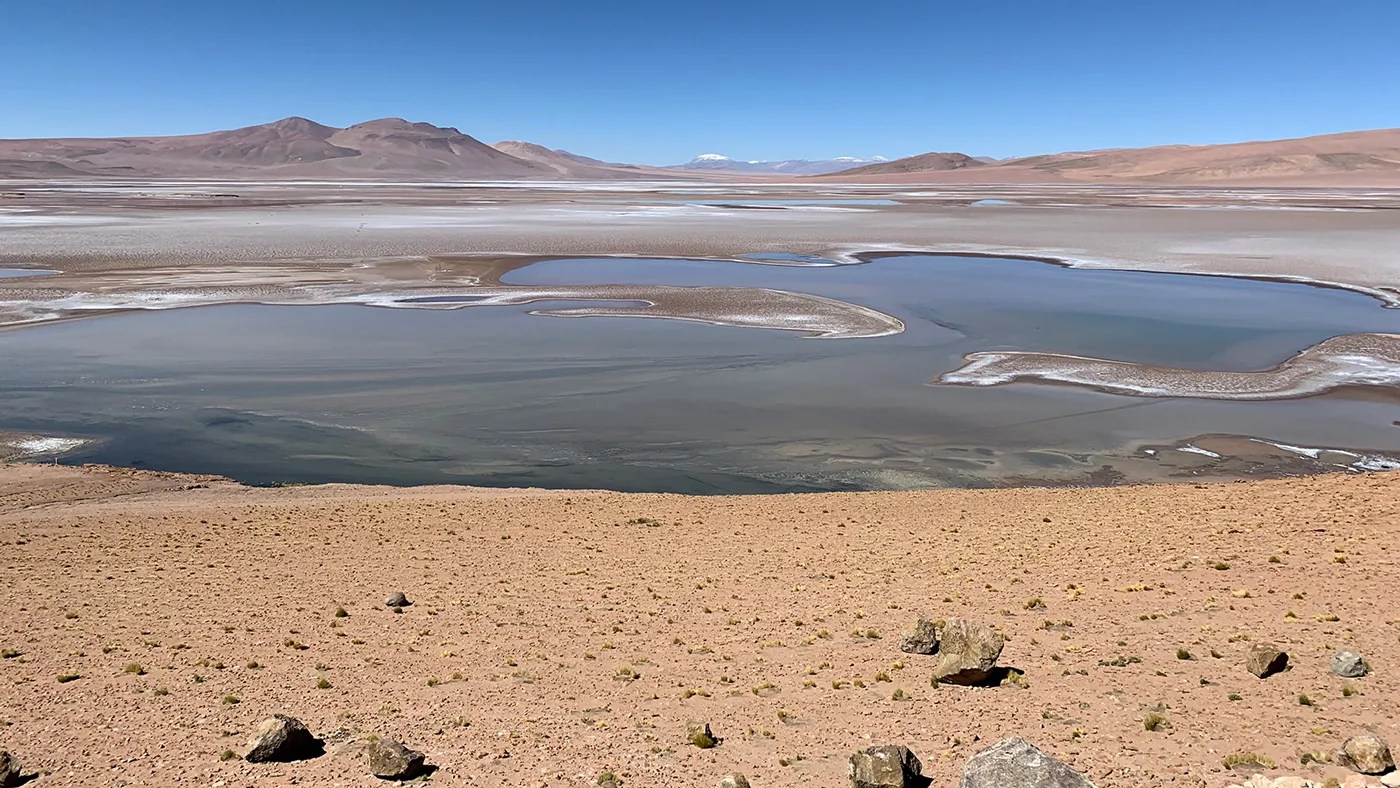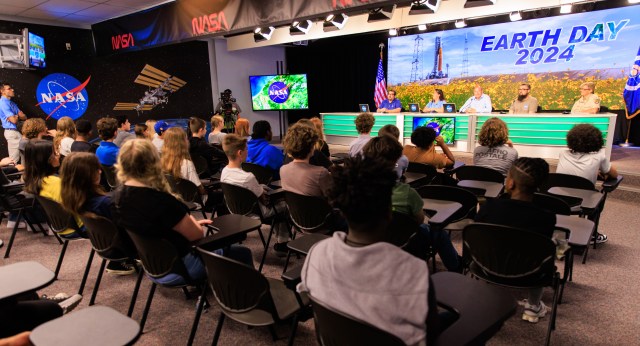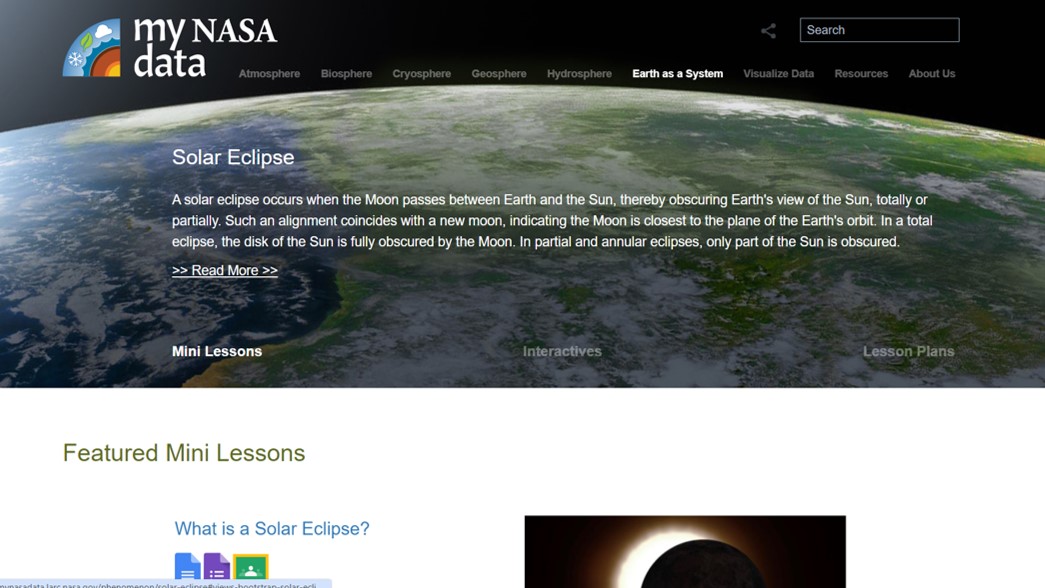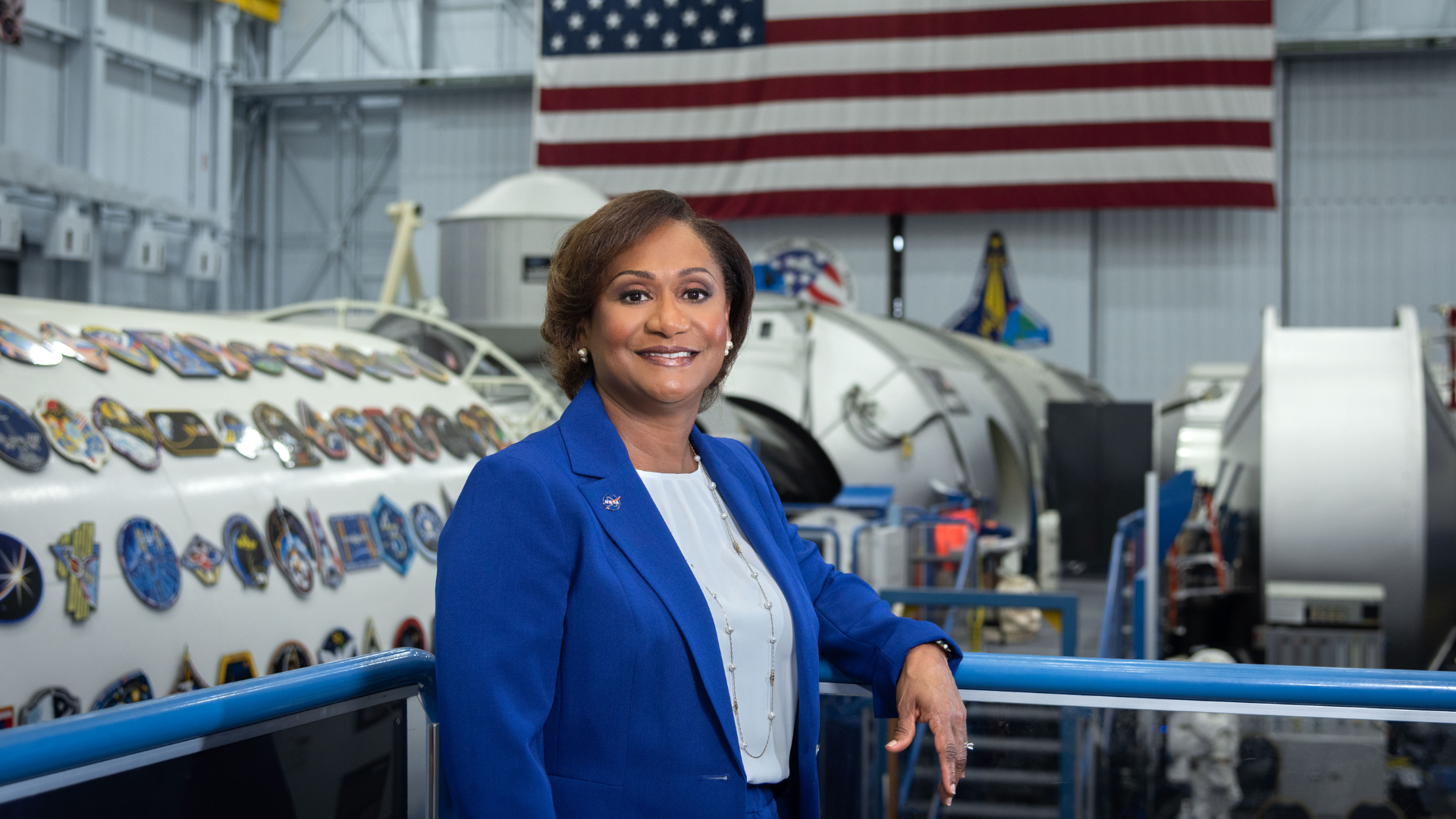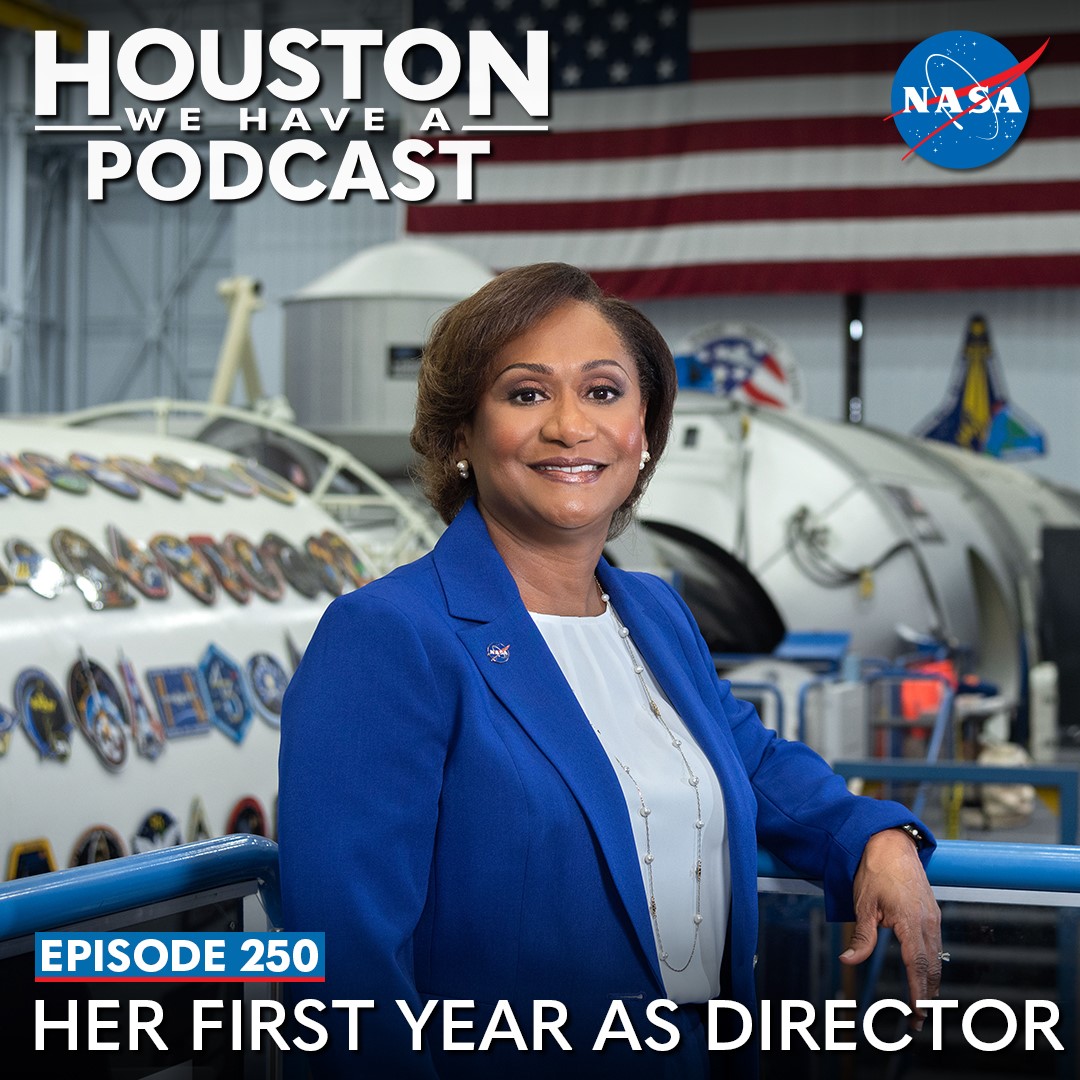
From Earth orbit to the Moon and Mars, explore the world of human spaceflight with NASA each week on the official podcast of the Johnson Space Center in Houston, Texas. Listen to in-depth conversations with the astronauts, scientists and engineers who make it possible.
On Episode 250, Vanessa Wyche reflects on her first year as the director of NASA’s Johnson Space Center. This episode was recorded on June 10, 2022.
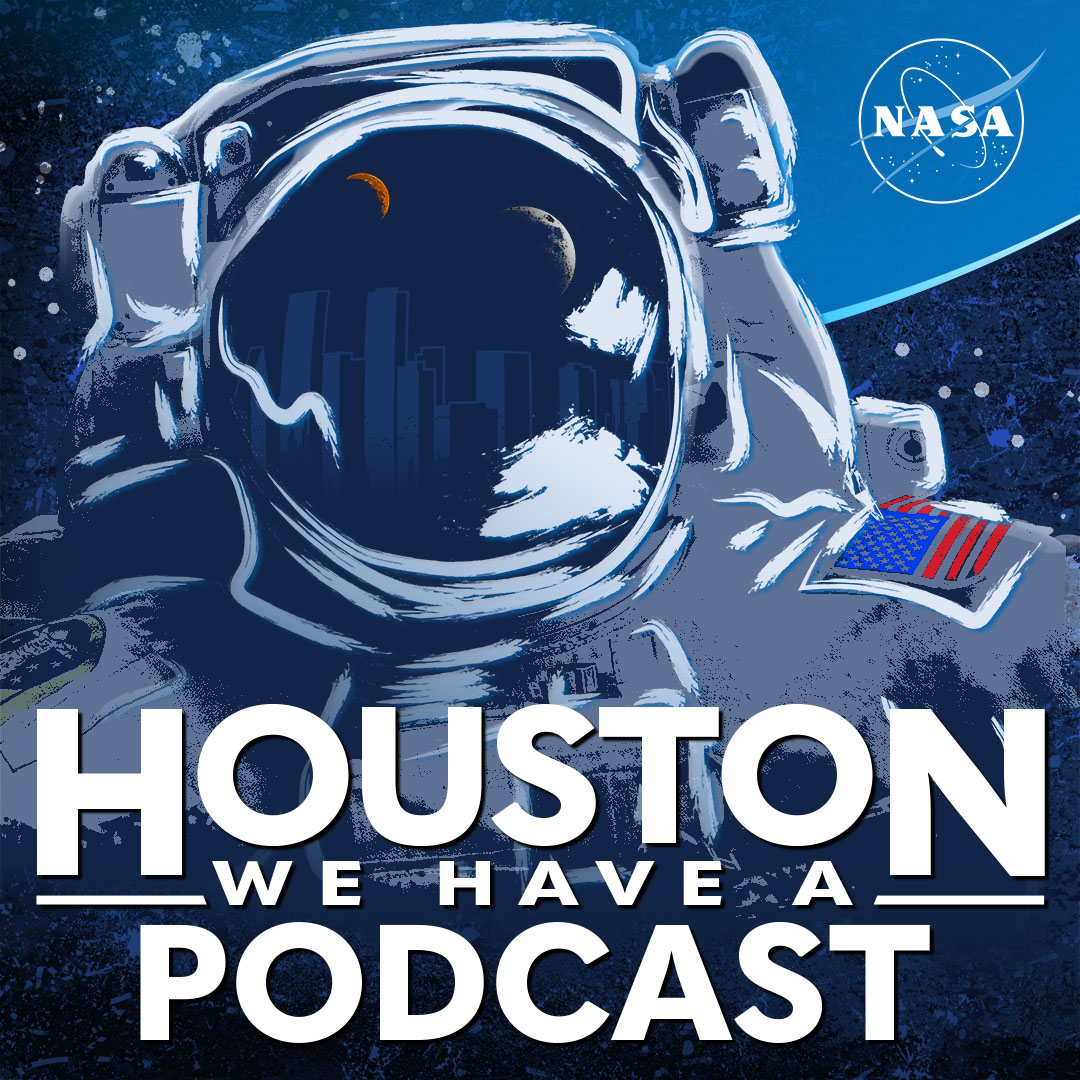
Transcript
Gary Jordan (Host): Houston, we have a podcast! Welcome to the official podcast of the NASA Johnson Space Center, Episode 250, “Her First Year as Director.” I’m Gary Jordan and I’ll be your host today. On this podcast we bring in the experts, scientist, engineers, and astronauts, and leaders, all to let you know what’s going on in the world of human spaceflight. In June of 2021, Vanessa E. Wyche was chosen as the 13th director of NASA’s Johnson Space Center, located right here in Houston, Texas. Wyche made history by becoming the first African American woman to be a director of any NASA facility, and the first African American, and the third woman, to be director at Johnson Space Center. Serving at NASA for more than 30 years, Vanessa began her career at NASA in 1989, holding several key positions such as flight manager in the Space Shuttle Program, director of operations and test integration in the Constellation program, and as associate director of exploration, integration, and science, and that’s just to name a few. She previously served as deputy director at Johnson [Space Center], a position that she held from 2018 to 2021. Vanessa is a graduate from Clemson University where she earned a Bachelor of Science in engineering and a Master of Science in bioengineering. In May, she was awarded an honorary Doctor of Science degree from Coastal Carolina University in her hometown of Conway, South Carolina. Vanessa has created an enormous impact in the community and beyond, leading Johnson Space Center into a new era. Serving as a role model across the country, she’s a passionate supporter of science, technology, engineering, and math, or STEM, and believes in the power of mentorship and the importance of always following your dreams, no matter the barriers that may stand in your way. On this episode, Vanessa will be looking back on her first year as center director of NASA Johnson Space Center and the plans she has for the future. Without further ado, let’s get right into it. Enjoy.
[Music]
Host: Vanessa Wyche, thank you so much for coming on Houston We Have a Podcast.
Vanessa Wyche: Well, thank you. I’m excited to be here.
Host: Absolutely. It’s been a year that you’ve been in the director position. I feel like it must have flown by.
Vanessa Wyche: Well, I would say in some ways it’s gone by fast, you know, but I’ve accomplished a lot in one year when I, you know, reflect on it being a whole year. So I don’t think it’s gone by as, as quickly as, as one might think.
Host: Well, that’s what we’re going to explore. We’re going to explore what you did, what, how you got here, what your ambitions are, that sort of thing. And, and, and we haven’t had a chance to have you on the podcast so I figured we’ll, we’ll start there. We’ll start, we’ll start from your childhood, bringing us up to, to what inspired you to pursue what you pursue — because you’ve been at NASA for well, more than 30 years, right? 1989 was your, was day one, was day one at NASA. And so, I feel like, I want, I wanted to start just, what, what got you here? How, what inspired you to, to pursue space?
Vanessa Wyche: Yeah, so, you know, Gary, growing, growing up, as a young girl I loved exploring: just being outside, figuring out how things were. That just was something I, I actually liked to do. So I grew up the youngest of, of five, both my parents were educators, so they pretty much instilled in all of their children the pursuit of, of academics, why it was important, and I always loved math and science. It was just, it came easy to me, so I enjoyed it, and so I did well in those subjects. When I was in school, we didn’t necessarily have like a technology high school or something like that. So I did go to a program one summer, it was called our Governor’s School, and so it was at a college campus, there were lots of other students that were interested in, in going to college, and that was the first time that I heard people talking about going into different fields. So they actually gave us a battery of tests — and so, what do you, you know, would they recommend for you, and the recommendation for me was to be an economist. I was like, meh, I don’t know about that. [Laughter] So, I actually went back home, and my parents and I talked and decided that I would finish high school a year early. So I finished high school and enrolled at Clemson University. And I began there as a biochem[istry] student. So, to back up a little bit, so my biology teacher in high school actually was very instrumental in me pursuing science as a career. I actually looked up to her quite a bit. She was just a very, she was a very interesting person, and she seemed to enjoy what she was doing, right? You know, and I was like, OK, yeah, and I like doing this too, so maybe this is something that I can go into. And so she said, you know, why don’t you look at it as a career? So I started as a biochem major. And, however, I quickly learned that I was not a fan of looking into microscopes a lot. And so my brother was in school there at the same time, pursuing a degree in engineering, and so, you know, we talked, I talked to my professors, and so, you know, kind of thought, well, you know, you like to analyze things, you like to figure things out, maybe you should go into engineering. And so, I switched majors and was like, you know, a light bulb went off and, of happiness. [Laughter]
Host: Awesome.
Vanessa Wyche: And so, I got my undergraduate degree in what is now materials engineering. And then I still, you know, liked biology, and knew that I wanted to combine that with the engineering. And so I was going to go to Georgia Tech after leaving Clemson for bioengineering. And my faculty advisor found out that I was going to go to Georgia Tech and they were like, well guess what, Clemson’s standing up a masters in bioengineering program; why don’t you stay here? And maybe to sweeten the deal, we can get you a fellowship. And so, I said, OK, well, that sounds great because there was not one waiting for me at Georgia Tech.
Host: Right.
Vanessa Wyche: So I decided to stay at Clemson and I got my masters in bioengineering. So anyway, so I got my masters and, actually began working for the Food and Drug Administration in Washington, D.C. At that time they needed people to come in with engineering degrees: they had doctors, dentists, several people to help them with medical device evaluations – so, think lasers, think implants into bodies, etc. And so I began working at the Food and Drug Administration doing medical device evaluation, and I loved it. Great job, it was very exciting. At that particular time, to date myself, was the beginning of the AIDS crisis in the United States. And so one of the things was trying to figure out how to help with prevention. And so I actually got to be a part of doing materials testing for prevention barriers to, to the AIDS virus itself. And that was quite rewarding to be a part of that. And you know, surgeon general [C. Everett] Koop, you know, you, and we had all these panels of all these world-renowned scientists that I got to work with. And so it just kind of was a really exciting time. However, I was in Washington D.C., a great city, there’s lots of different people. And I met someone that I actually fell in love with.
Host: Ah.
Vanessa Wyche: And he asked me to marry him. He was finishing up law school at Georgetown [University] and he was a native Houstonian and he wanted to move to Houston. And I said, OK, well, if I go to Houston, I have to have a job. So I have to start thinking about what that would look like. And so that’s actually how I ended up at NASA. I needed to find a position, I came down here and I interviewed and actually began my career in what was then called Space and Life Sciences doing experiments on astronauts. So kind of still along the same lines of what I was doing before. Now, it was helping internal and external PIs (principal investigators) with developing hardware and their experiments, helping them to be able to be space-qualified and to be able to do these biological experiments in space, as a part of us understanding how humans actually live and can live in space.
Host: A lot of folks we talk to have that space bug, but it seems like you had more of a, because of that, that teacher, that mentor you had, you had more of the biology bug. You never seemed to let that go. Even when you pursued engineering, you still hold on to the biology; even at NASA, you wanted to, you wanted to be involved. It, it just, some, seems something that you’re just very, very passionate about.
Vanessa Wyche: Yeah, I am. I’m very passionate about it. I mean, for me, what I do, and I love doing, is seeing us send humans in space. I know what it does to the body and the studies that we are continuing to do, many of them have roots and studies that we’ve done years ago, so we have a database of, of astronauts, subjects, that we, you know, looking at those changes in terms of the physiology, as well as continuing going forward knowing that we still have a lot to learn as we want to go to the Moon again and have extended stays and then going on to Mars. So I get to continue, even in the role that I have today, of applying that particular expertise.
Host: So that’s what I want to explore for just a bit is because you, you’re in this very technical world, you pursued a very technical thing; not, not only engineering but even, even the sciences, the hard scientist. You said, you said you weren’t necessarily interested in microscope, but, but I imagine it was like a sort of a heads down sort of thing. I wonder, I want to get a sense of where this idea of, of leadership started coming into play, because some of your roles as you go, as you look at your career, you had more responsibility, more management, and that seemed to be something that you, I wonder, I want, I want to get a sense of it, if it was something you were actively pursuing or maybe just sort of fell into? Can you talk about that transition and that, and that, that move from more technical to, to more human and people-focused?
Vanessa Wyche: Yeah. So I, I will say, actually the very first job that I had at NASA, a little bit different. So the jobs at the Food and Drug Administration were kind of more like individual player, because, you know, you would either be, you know, working with a science team and you’re, you know, or you’re working with the company, or it would be more of an individual player. When I came to NASA, immediately it was working in teams. And so beginning as a project engineer where I was responsible for a particular payload, let’s say, I still had a team of contractors, external PIs that I had to get everybody on the same page, right? And so that was really the first beginnings of leadership and leading a team was, you know, hey, how do you lay out the vision, how do you lay out a schedule and say, OK, we’re going to all work to the same thing? And I actually enjoyed it quite a lot. And so, I, from the project engineer position, which I had like maybe a team of maybe 12 people or so, right, to then being responsible for entire suites of payloads that we flew on what was called Spacelab and we flew it in the, in the shuttle, so then being responsible for teams of, let’s say, you know, 30 contractors, maybe 10 or 15 civil servants, and then the external community, so it could be like 40 to 50, 50 people. And again, you know, laying out what are our roles and responsibilities, what is, you know, my job is X, your job is Y, and empowering people to go off and do their, their piece of it, and then it all coming back and rolling, and then seeing your final product, you know, flying and working in space. That’s, I kind, I kind of got the bug. And so, then I started, I switched and went to the shuttle program. And again, I had responsibilities for payload integration and working with, you know, internal teams, external teams on similar kinds of things. So getting there, whatever there, then I went from being, being a life science-minded to having satellites, to just, you know…
Host: Yeah.
Vanessa Wyche:…and so that kind of broadened the, the expertise. But I would say, you know, consider it systems engineering, no matter whatever the system is.
Host: OK.
Vanessa Wyche: And so, moved on to then being a flight manager for shuttle missions and teams of like 3000 people, right?
Host: Wow.
Vanessa Wyche: And so, but I, what I did learn was those skills translate. The ability to work with people, identify what the problem is, say this is how we’re going to solve it, this is what the solution is, whether it could be from a integration standpoint you may already have what your solution is, what the plan is, but still getting everybody to buy into it. So sitting down as a team early on and establishing how we’re going to work together as a team, what are our jobs going to be, what are our roles going to be, and then really empowering others to do their part. Not micromanaging them, saying, you know, this is what the schedule is, expect the product by whatever the date is, and then it all coming together. And I mean, to me, I still get great thrills out of all of our missions, right? So like, you know, now the, the missions that we’re doing to the space station with our commercial partners, watching how NASA and SpaceX or NASA and Boeing work together to put together these very complicated missions that have a, you know, end result of our, our astronauts getting to space, thriving, working in space and then them returning safely.
Host: It’s that, that must have been something that you, you mentioned it as a bug, you got the, you got sort of a management bug. And I think there was a little bit of a bug, but it seemed like you were also very good at it. Because you, I see a, a couple different roles that, that you sort of progressively just got more and more responsibility. You talked about, you talked about in the beginning there was that you were a team of contractors, a team of principal investigators, and then you said managing 3000 people: it became more and more challenging, but you just seemed to want to take on those challenges. I wonder what drove you to do that? To, to just say, all right, I think I’m getting good at this. Let me, let me take it to the next level.
Vanessa Wyche: Yeah. So I, I don’t know. I think part of it is, yes, I recognize that it was something that I liked to do, I was passionate about it. And then the other is, is that, you know, just knowing I, I’m very passionate about human spaceflight, and so in order for us to continue to do that, somebody’s got to step up and do the job, right? And so, willing to do it, liking to do it – so why not me?
Host: See that, you said you’re, you’re passionate about human spaceflight. I wonder where that came, came up, because remember we talked about, you talked about biology, we talked about engineering; it seems like, it seems like at some point in your career you started to really fall in love with what we do at the Johnson Space Center.
Vanessa Wyche: Oh yeah. Absolutely. Day one.
Host: Day one. Wow.
Vanessa Wyche: Day one. [Laughter] Yeah.
Host: What sold you? What sold you?
Vanessa Wyche: Well, I mean, just that, you know, so, so coming here, day one, and some of the challenges of spaceflight, especially, like I said, when I started I was looking at the physiological changes; human adaptation to space. And so seeing how we can actually learn and then make changes, what we call, you know, risk mitigation or the ability for us to figure out ways of adaptation. And so, seeing how you could actually, you know, make a difference, that I think was really what got me excited, is that this was something that I could really see us as a, as a country, as a, as a species, being able to learn how to live on other planets, other worlds. That it’s really not just science fiction, but this a science possible.
Host: As you, as you move through your career, you had, you, you touched a lot of different places of the, of the Johnson Space Center. You mentioned shuttle, you mentioned, you know, there’s, and then there, you went into a position of exploration, integration, and science, right? As you were going through your career and started taking on these new challenges, what did you discover about just the breadth of human spaceflight, because a lot of people equate, especially shuttle, right — they think, human spaceflight? Shuttle, right? — but there was, there was just a lot. What did you discover as you were going through your career?
Vanessa Wyche: Yeah, so obviously, you know, especially, so I was, you know, working in the shuttle program; loved it, loved what we were doing. And, but I wanted to be a part of learning about how new vehicles could be built and the capabilities of being able to do deep space exploration. So I did move over to, at that time Crew Exploration Vehicle that was the, the, predecessor to Orion.
Host: Right.
Vanessa Wyche: And so, I, I went, and just spoke to the person that was leading the group at the time and said, hey, I’m interested. And he was like, sure, join the team. So literally, just packed up my boxes and, and just, just started working on something new and different. And so, you know, for me, just looking at the ability for us to, you know, proceed, to go further, to go to the Moon again, that we had to have a new vehicle to be able to do that. So I wanted to, to be a part of what would it take to be able to design, develop. So for Orion, seeing it today, we’re about to do Artemis I, the uncrewed test, you know, we laid out that as a part of our flight test program years ago. And so, now, fast forward, we’ll be finally putting our humans on board and, you know, all of the things that it takes to be able to do that, that it’s very complex. It is not, you know, as you said, you know, people think of, you know, shuttle, you know, that was a, a LEO (low-Earth Orbit) capability, it allowed us to build the International Space Station. And now we’re learning a lot on the space station. We’re using it for discovery of things here on Earth as well as things that we’ll be able to, to do going forward into the future. But then looking at the capabilities that we’ll need to be able to go to, to the Moon, having a Gateway where we’ll have, you know, crews that’ll be go, they’ll stay for like 30 days, they’ll be able to go down to the surface with the landing system and then return, eventually having a, a base on the lunar surface. You know, the things that it’s going to take to be able to do that, well, we’re learning those today using the International Space Station, those technologies were proven out so that when we eventually are able to have a lunar base, which then will allow us to learn the lessons that we need to have to be, to have a Mars base and going forward to Mars. That is all interconnected, is all tied together, but it is really, especially for, you know, we, we are on Mars today, right, with robotic missions, but having a human there is going to be, I feel a complete game-changer in people understanding exploration of other worlds. When they see humans walking on the surface of Mars it will be, you know, like today, Perseverance, you know, great, everybody was very excited about the landing, but just imagine what it’s going to be when there are actually humans walking on Mars.
Host: You must have seen that, sort of whenever you, you, you transitioned from the shuttle and then you had this interest with, with this new program, the predecessor to Orion, this CEV, you must have seen some sense of the potential for what, what that, what, where we’re at right now, and you sort of want it to be a part of that. Looking at that, looking at where, when you first thought about that potential and, and started working with the CEV to where we are now, thinking about that level of progression and just how we, how we further defined what that, what those possibilities are, what excites you most about that progression? About just thinking about where we were, where you were for CEV to now, and then where we can be in the future, what excites you?
Vanessa Wyche: Oh yeah, no, it excites me because, you know, I know that the transportation, you know, of getting to a destination, you know, is, is going to be the toughest part, right? When you even think about exploration here on our own world, right, you know, being able to take ships that finally got to the New World, and then it allowed, you know, commerce to begin. And so I look at that the same, as that with the human exploration of Moon going on to Mars, we had to have the ability to get there first. And then now, you know, once we’re able to, to demonstrate, to do that, then we’ll be able to lay the infrastructure in to be able to do exploration of, of the Moon, further exploration of the Moon, and then exploration of other planets.
Host: Backing up to your pursuit to, to, to enter into this world. When, when you found, what, what was it about what was going on in your, in your career, where you were being successful in your job and you, then you decided to walk up to someone and say, I want to try something new, what was, what was going through your mind and, and, you know, what, what inspired you to just go for it?
Vanessa Wyche: So, as a young child I was always a very curious person and my parents encouraged me to be curious, to try new and different things. And so, I think that, really, Gary, kind of just became a part of who I am, to say, you know, why not try something different, why not learn something new. And so, it was a risk, you know: one, I could have been told I’m not in, I’m not interested, or two, you know, it could have not worked out, I’m, you know, I may not have done well. But I, I just felt like it was, it was the appropriate time. And so I, I just stepped out and just decided that I was going to take the risk to try it.
Host: All right. Now when you got to the position of, the exploration, integration and science, you, you served in a, in a management capacity of a, of that division. I wonder when you entered into that, this was, this was really, you, you know, you talked about overseeing people — now, you’re, you’re overseeing almost a plan, an entire organization. I wonder how you started approaching that, taking on that new challenge of working specifically with a division and the leadership approach that you took to that?
Vanessa Wyche: Yeah. So, you know, the, the good thing about it was, you know, the center had done a reorganization and, the organization had been formed about two years before I got there. And so when I got to the organization I knew very well the exploration pieces of it, because they had been a part of what had been the Constellation program, which I’d been a part of that program. So I knew all of those pieces. It also then included the EVA (extravehicular activity) organization, which that was added in, into that group. And when I worked shuttle, of course, managing a shuttle mission, once it assembled the space station, it required EVA as a critical component of making that happen. So I knew the people that were in that organization very well. I knew what their, their positions were, I knew what they were capable of as well. And I also knew the role that they had with space station currently, and the role that they would have going forward for exploration. The one group that I was not familiar with was the science organization. And so, but of course, my fascination was science…
Host: Right.
Vanessa Wyche:… and, and so, you know, my very first day they were, OK, we want to, you know, show you everything that we have, we want to show you all the testing capability, and so they could tell that I was super excited…
Host: Good.
Vanessa Wyche:… you know, about the work. But understanding how it all fit together, right, it was looking at, you know, you had a team of, looking at mission architectures, how do you plan these missions, to system integrators that would help to integrate the mission, as well as the EVA folks, which would be critical to performing and conducting the missions as well as, there’s an organization included that looks at performance and planning. So, budgets and, and how do you support doing assessments for laying out those particular missions, and then to include the scientists as a part of that — so the, you know, why are we doing this in the first place — it was, to me, this is like the best, right? So you got the whole end to end…
Host: Yeah.
Vanessa Wyche:…in terms of a, of, of a capability to provide, to not just the center, but to the agency. So I, I was very thrilled to be the, the leader of the organization. And, so for me, it was making sure that each of those groups, that their skills were being included in the agency’s plan. So working with my counterparts and other people at headquarters that were kind of laying out, I think when, when I first started we hadn’t quite pivoted all the way back to the Moon plan, we were still a little bit on the asteroid, you know…
Host: Right, right, right.
Vanessa Wyche:…yeah, so, so making sure that, the, the ideas that were coming out to headquarters, that we were able to lay those out into actual missions that we could accomplish. So taking the, the group, and then we had a, like, I remember we had a, we had a retreat, maybe like two months in, to say, hey, what are, what are, what are the roles that we have within the agency, within the center, and how are we utilizing that to accomplish NASA’s goals and the center’s goals? And so, it, it really just was that, you know? You kind of have to say, you know, again, it goes back to what is it that we’re trying to do, and then, then laying out how we’re going to do it. And from my standpoint, as being the director of that organization, my responsibility was to make sure that everyone had the resources that they needed, and whatever agreements that I needed to make with headquarters or with other organizations here at the Johnson Space Center to make that happen.
Host: Seems very challenging from your description because one of the unique things that popped out to me when you were describing this particular division is, they all seem like they should be siloed, right? You got this, you got the science people, you got the budget people, you got the planning people, you got the EVA people, they all seem like they should be doing different things. But it sounds like your role was to take these very different things and give them the resources they need, integrate them, make sure that they were, had the resource, had, were connected to agency level missions. Your, your director, as the director role you were the grand integrator, making sure everything sort of flowed. That seemed I, that face value to me, it seems very challenging.
Vanessa Wyche: Well, maybe, but it was really fun [laughter] because I could see where and how each person fit into NASA’s overall goals, right? And so, how to get everyone to understand how they played together…and once they did, and they saw, then the science team and the architecture folks they started on Fridays, on their own, having meetings where they got together and talked about, OK, hey, if we’re going to go to the Moon, where should we go, and having those discussions independent of actually being asked to do that.
Host: Very good. All right. Self-motivated people. I feel like at this, this skillset of, of taking all these different aspects and trying to integrate, I’m talking with the people, making, making those agency connections, prepared you eventually because you made your way to the center director’s office. You, you, as the director of Johnson Space Center are of course, in that office, but, but you didn’t just go in, you, you’ve been there for, for a little bit. And I wonder how those skills, it seems like those skills would translate very nicely. And I wonder how that transition happened.
Vanessa Wyche: Yeah. So, you know, I, I look at my, I’ve had lots of jobs — so one might think, well, can she keep a job? [Laughter] But, but it has taken every job that I’ve had, I feel, to equip me to do the job that I have today. I’ve learned something from every single one. So actually, before I became director of exploration integration and science, I had done a job at the, the center level, that was like an assistant center director when Ellen Ochoa was, was the center director.
Host: OK.
Vanessa Wyche: And so that role allowed me to learn more about the agency, because I had done a rotation at NASA Headquarters earlier in my career, which was very beneficial to understand how the agency worked. But then when I had that particular role, in support of the center director, that allowed me to understand how the center director interfaced with the rest of the agency, and the specifics that were required for the center to be able to get, you know, the resources, to get the assignments that we have at the Johnson Space Center. And so, it was, I think, very critical. Then I went to exploration integration science and was more of helping the agency with developing the new plan of us going, now to the Moon and going to Mars. So now fast forward, where I am today, having been a deputy, and during that particular time helping with getting the Gateway program here and being a part of the negotiations to secure that as a, as an assignment for this center, which is a critical component of the whole Artemis plan. As the, as the deputy I also was then able to learn and work with other deputies across the agency, to understand how the Johnson Space Center can work and leverage with others to accomplish our goals. And so, and also learn more about the center. The Johnson Space Center is huge: 3,000 civil servants, you got like almost 8,000 contractors, we have another, you know, satellite center in New Mexico, plus we have a team in El Paso. Our, our, you know, capabilities are very broad. I mean, we have everything from airplanes to responsibility for the Orion spacecraft. So learning how the center works and all of the support organizations that are critical to making that happen, and learning the, the people, I, I felt like the, the deputy position really prepared me now to be the director, where I have responsibility for setting the vision and, you know, ensuring that we have excellence in our missions today but also that we are ready to support where we’re going to go in the future. So I’m very proud of that, in the past year, you know, I have been able to accomplish us having, you know, a new program where we have now our EVA and our surface mobility elements in one organization. And we’re going to be supporting both space station and going forward with our exploration. And then just recently, where we were able to award, you know, contracts for new suits that we have not had since, you know, 1980. So it’s, it’s a, it’s a big deal. And as, when you see the signs of, you know, Dare Unite Explore across the center, I want people to, to understand that really what that’s about is how do we put out big, bold ideas for ourselves. Because three years ago, we said we wanted to have new suits. We had been working on it in terms of technology and making great strides in the development, in-house development, which is, we needed to do that in order for us to be where we are today. But we did not have the dollars that were defined and identified for us to be able to do that. And so, the work of the center director is, you know, orchestration of what’s going on today, but it is about planning and strategizing so that we can go forward into the future. So it’s been quite a lot to, to learn.
Host: Yeah.
Vanessa Wyche: But, but, you know, kind of having the knowhow, how do you piece all that together, because I feel it’s important that everyone, when they come to the Johnson Space Center, that they understand how they fit in the bigger piece of the puzzle…
Host: Right.
Vanessa Wyche:…and that we really are the enablers of human spaceflight. That is what we do here.
Host: This passion you’re talking about, and, and there’s, there’s a mix of passion and, and preparation that I feel like led you to, when the opportunity opened up to become center director, it seems like you, you, to me, you would approach it with a certain level of preparation with the experience necessary based on everything that we’ve discussed, but you, seems like you have this, this drive, this vision. And I feel like that — am I reading it right, that you went into this position confident? Can you talk about when you actually like got the position, when you were applying for the position? Am I, am I reading that right?
Vanessa Wyche: Oh yeah, absolutely. I mean, so, I mean, I would not have actually put my name in the hat had I not thought that I was actually prepared for it, right? So, you know, I’m the mother of an Eagle Scout; I was a Girl Scout — preparation is like, you know, fundamental. [Laughter]
Host: All Right.
Vanessa Wyche: And so, you know, I knew that I had a really solid understanding of the Johnson Space Center and of the needs of the Johnson Space Center, and that I had a vision to be able to carry us forward into the future. And so, take that with our, we already talked my, my passion all things, human spaceflight.; and so when I spoke with the administrator about the position and he was, you know, vetting me for the job, I’m, that’s what I shared with him. Is that, you know, I do feel that I’m, you know, prepared, well-qualified, and very passionate about the Johnson Space Center and our success.
Host: So tell me about that moment, when you got the job, how did it feel? What was that moment like?
Vanessa Wyche: So it was very exciting, you know? I, I will tell you, you know, it’s one of those where you think, OK, you know, I, I will be happy or I will be excited or I’m, I’ll be thrilled. But it was really a, a very emotional moment in terms of, I literally, literally squealed on the phone. [Laughter] Literally. And I was like, oh my God, I’m in my office, so I don’t want people to think that there’s something going on in here. So I had to calm it down. But yeah, I did.
Host: So, very exciting moment. You said emotional, but I think, one of the things that’s apparent to me is you came into it with goals and a vision. And I have no doubt that you hit the ground running. So tell me about some of the, some of the first things that you said, OK, I’m the director now, here’s, here’s what I’m going to do, here’s what I’m going to start accomplishing. I really want to focus on this first year as director. What was some of your, what were some of the things you set out to do and started immediately?
Vanessa Wyche: Yeah, so, so immediately, Gary, I knew two things: that, you know, I had to make sure that everyone was clear — no change: excellence in missions…that’s what we do at the Johnson Space Center. Hands down, there’s no fuzz on it, everybody knows that, right?
Host: Right.
Vanessa Wyche: And so, clear broadcast to the team: no, no change there. We’re going to continue to be who we are, that’s in our DNA. The second thing was we have to transform for the future. The world around us is changing, and the way that things are being done is being done differently. And we don’t want to be Kodak, right? We don’t want to be, you know, the dinosaur that did not move and change as they saw the environment changing. And so, ensuring that our industry partners, as they want to do things that align with NASA’s goals, are things that are different from NASA’s goals, but it, that they understand that we have the technical expertise, we have the facilities that will enable them to be able to do that faster, and so communicating that to industry and academia was very important to me. And so I’ve been very pleased that we have had very good discussions and various forums. We just held a conference called to ASCENDxTexas (Accelerating Space Commerce, Exploration, and New Discovery) with, in coordination with the AIAA (American Institute of Aeronautics and Astronautics) where we brought in industry, we bought in investors for people to come in and they could understand that if people want to do human exploration in space, Johnson Space Center is the place where they want to have that connection. That we are going to be that hub. And so I feel really good. And we have companies, as you know, Johnson is also responsible for the new LEO commercialization efforts.
Host: Right.
Vanessa Wyche:And there are companies that are going to be building follow-on space stations. So for them to know that we here at the Johnson Space Center, we’re not just responsible for the program, but we also want to be a part of those new efforts. We want to be the people that are helping to build these new space stations, where our astronauts or other private astronauts are going to go, and they’re going to work, because we are going to continue to have a need to do exploration in low-Earth orbit. It’s close to home, we can send things, like four hours they get there, we can experiment them, on them, learn, bring them back, and then fold that into our exploration efforts. But, so making good strides there. The whole, you know, contract for the EVA suits was, was significant. We are doing that differently, we’re doing it as a service contract: we won’t own the suits, but we are going to be able to give our requirements, our needs, to industry. As they design and develop them, we’ll be a part of, of engaging with them on how they’re doing that. They’ll do the testing here at the Johnson Space Center, so we’ll be a part of that. And then our operators will be the ones that will be operating those suits. So the way that things are being done may be somewhat done differently, but the outcome, the end result of us being able to continue to do human space exploration, is the same. So those were the key fundamental things for me. Day one was to get moving on those initiatives, so that all of our workforce can, you know, feel pride in what we’re doing. And also, for them to know, we have a very bright future.
Host: Right.
Vanessa Wyche: We are going to be continuing to do space exploration well into the future.
Host: Focusing on the commercial aspect for a second. And, and really, just this past year of you as, as director, a lot has happened. We’ve had commercial cargo; we’ve had crew rotation missions on the SpaceX Dragon; the first private astronaut mission to the space station; the uncrewed Boeing test flight; and then of course, this contract for suits. I’m probably missing a couple of things too, but that’s, that’s, in just a year, that’s a lot of commercial stuff. If, if you look at your, the goals that you set out for establishing the, the Johnson Space Center as this focal point, and, and moving with the speed of industry, how do you feel reflecting back on this last year and looking at all the commercial missions that were accomplished? How do you feel, do you think we did it?
Vanessa Wyche: Oh, yeah. Absolutely; absolutely. And you know, again, these are our U.S. astronauts that are flying on these commercial vehicles. The private astronaut mission of enabling them to be able to go to the space station, to use that facility, you know, that took a lot of cultural change for us to be able to accomplish that in addition to the technical. But those are, and we are getting science results even from the, from the private astronauts, right? So all of that folds into our long-term exploration goals as well. So, no, I, I’m very pleased with, with all that we accomplished and it’s amazing to me…
Host: Right.
Vanessa Wyche:…that we were able to do all of that in just one year; just one year. [laughter]
Host: That, that’s just the commercial element, right?
Vanessa Wyche: Right.
Host: Like what you, you mentioned the exploration element too.
Vanessa Wyche: Yeah. I mean, we are, we are building a rover that’s going to be a part of one of the robotic missions to the Moon, called VIPER (Volatiles Investigating Polar Exploration Rover). And that’s being tested, lots of great, you know, effort being done there. We’re, we’re helping to support a program called Commercial Lunar Payload Services, which is robotic missions to the Moon. And, you know, our, our engineers are a part of that. We are, you know, Gateway, you think about, you know, what we’re doing with the Human Lander System.
Host: Right.
Vanessa Wyche: The support to those activities. All of those efforts are, have been accomplished within this past year.
Host: How do you as center director try to manage it all? Is it, is it maybe, is it a reliance on people? Is it, is it absorbing and communicating? What is as, as a single person, as that focal point, the person in this, in the, as the center director, lot’s happening; that’s very, very apparent. How do you, what is the, what are the things that you’re focusing on to make sure everybody’s successful?
Vanessa Wyche: Yeah. So the first thing, you’re absolutely right, is to have a good leadership team. And so, number one for me is making sure I have the right people that are in positions. And so, the selections that we had this year of, you know, Lara Kearney as being the lead for EVA, of Howard Hu for being Orion, you know, the, the changes that we have in our leadership team, because there’s going to always be change. People are going to, you know, move to new positions. If I’m doing my job right, then I’m helping to grow people so that they can go take on higher responsibilities. So like, Cathy Koerner moving up and being a deputy [associate administrator] of our Exploration Systems [Development] Mission Directorate.
Host: Right.
Vanessa Wyche: And so, that, that is very important because once you get the right leaders, again, then it’s their responsibility to lead their particular org[anization]s, right? And so, I am, you know, reliant and relying on them for them to take on the responsibilities that they have assigned to them and to carry them out effectively. Now, as the overall leader, especially for our missions, right, you know, I’m still responsible for signing off on the flight readiness to say that our astronauts can get on these vehicles. And so, the Commercial Crew Program, they have, you know, responsibility for working with the provider and our safety folks, our health, human health and performance, engineering, everyone is reviewing and making sure that the procedures, our flight — you know, FOD (Flight Operations Directorate) – – everyone has a critical role, but it is my responsibility to look at all of the data and say, I’m satisfied that everyone has done their jobs and we’re good to go. So I, and I take that responsibility very, very seriously. That is my number one job is the, the safety and mission success of our, of our astronauts when they go into space, and then making sure that I have the right leaders in all of these positions and then holding them accountable for doing their jobs. And I do, and they do a great job. [Laughter] And so, at the end of the day, we are able to accomplish all of these great things, but it is not me by myself. It is having a leadership team that’s in place that is able to do those positions.
Host: If you reflect on the responsibilities of what it takes to, to sign off on something so critical, right, you say, you say you take it very, very seriously, you have to analyze data, you have to rely on people, you have to have very trustworthy people; when it take, when you, when you think about that level of responsibility and the qualities that you’ve built up over your career, over time, through all of these different aspects, what are some of the key things and, what key characteristics, key traits, that you think is critical to be a successful leader?
Vanessa Wyche: Oh. One is listening, and listening to understand, and the ability to have critical judgment capability. And sometimes you have to be able to make decisions, not based on every piece of information — you may not have at all — and so that’s where you’re, you have to then have experience that you draw on that gives you that judgment. So, I do think it’s, it’s those things, but then a large part of it is, you know, again, being confident in your abilities, be, being confident in your team, and that they have done their, their due diligence. But then, you know, when I have our center-level Flight Readiness Reviews, always stopping and asking, is there anything additional, are there any dissenting opinions? But making sure that you have as much information, all of the facts, all the data that you can, and then, you know, making a good sound decision.
Host: A lot of people look up to you for that, for that level of responsibility, especially internal, you got leaders, you got, you got people that, that are relying on you. But I think about externally as well. You, it’s, you are the first African American woman to, to, to be a center director: that is something that I think people look up to, especially little girls that look up and say, I want to be like you. When you think about that responsibility, I’m sure, I’m sure this is not, this is not a new thing, I’m sure people have asked you about, to try to learn from you and, and take, and look at you as a mentor, in their own, to little girls that want to be like you, how do you handle that responsibility?
Vanessa Wyche: Yeah. So at first it was a little intimidating, you know, I’m just like, OK, you know, that’s, that’s a, a lot.
Host: Right.
Vanessa Wyche: But I will tell you, Gary, I have, I’ve embraced it, because I know that it does matter. For my, myself, you know, coming along, when I first started at NASA there were not a lot of women in certain roles. And so you kind of felt a little bit alone in trying to figure things out. I was fortunate to have male mentors that were willing to pour into me to, you know, give me advice and, and, you know, to tell me, you know, you can do this, gut it out, you know, and, and to keep encouraging me to keep going. But I will tell you that, you know, when I saw Ellen [Ochoa] as the center director and the things that she was able to accomplish, it let me know that, you know, I too could do that. And so, I know for me, it’s important for me to share my story…
Host: Right.
Vanessa Wyche:…so that others can know that they can do it too, that this is definitely something that they can achieve.
Host: Is that the message that you pass on when you get those questions? What, what are some of the things, when, when young girls ask you, how do I be, how do I be like you…
Vanessa Wyche: Yeah.
Host:…what are some of the pieces of advice that you give them?
Vanessa Wyche: So, first I tell them find your passion, you know, because like you said, I do this because I’m very passionate about it.
Host: Yeah.
Vanessa Wyche: But, you know, find your passion because it is going to take a lot of dedication, it’s going to take a lot of time, it’s going to take a lot of hard work. And if you are not passionate about it, you, you know, you’re not going to do well. So first, find, find your passion, but then, you know, understand that sometimes it’s not going to be easy. It’s just not. And it’s going to take, just like I said, there are going to be no’s, there are going to be, you know, some obstacles thrown in your way, but if you are passionate about it, you really want to do it, then you’ll figure out ways to navigate. You’ll figure out how to take, take a “no” and say, OK, it’s a no; what can I do differently, what can I change about myself, what do I need to learn, you know, what, what do I need to do to be prepared, you know, to, to make it the next time around? And then when the challenges come, you know, if you really are passionate about it, you really want it, you know, you’re willing to deal with sometimes some crappy situations to get to where you want to be.
Host: All right. Now, you’re obviously not done as director; you, you, this is just your first year, and I’m sure you have plans for, for what’s coming up. And one thing that I think is, is very apparent if you look pat, if you look at this past year, is that things are moving fast. [Laughter] There’s a lot happening; very, very speedy pace. What are your goals going forward to keep the center moving and the pace that you want, and you mentioned your goals of keeping Johnson Space Center as a focal point for a lot of things, of moving with that speed of industry? What are, what are your, what are your goals going forward?
Vanessa Wyche: Yeah. Excellent. So, again, number one, [laughter] excellence in missions, because we don’t get to be the Johnson Space Center, if we become like number five. That’s not how it happens, right? So we have to stay focused on that and we have to be, you know, on our A game. So, you know, so keeping our folks with whatever resources they need to be able to do that. But then, number two, it’s just what I said, you know, the whole Dare Unite Explore, how do we keep ourselves, you know, game changers? How do we make sure that we are the people that people want to come to? And, how do you come and work with the Johnson Space Center? So one of the big things that you’ll see us working on coming up in the future is, you know, as you said, industry wants to move fast and the government doesn’t move fast. So, how do I make it as easy as possible for others to want to work with us? So you’re going to see us kind of unveiling how we’re going to be doing that going forward in the future.
Host: Wow.
Vanessa Wyche: That’s going to be coming very soon. And so, and I’ve been working with my headquarters counterparts on how can they help me to reduce the red tape so we can move faster, so we can move at the speed of industry. So those are some critical things that you’ll see moving forward. And then the, the other part of it is, though, then it’s that, the what, what we’re going to be doing, and so ensuring that we are going to continue to have really good meaty programs and excellent work for our workforce. That is what I see coming forward for the next year and for the next, you know, couple of years.
Host: It’s, it’s exciting to me to hear, you’ve been at NASA for, for 30 years and I, I don’t get a sense of you slowing down at all. [Laughter] You’re, you’re moving. But, but your, your goals, you know, there, I wonder, when you, when you think about that as the director, you have a lot of ability to change, to change the way that things are, and, and your vision is very clear to me of how you want that change. What is your goals in terms of what you, the mark that you want to leave on the, on the Johnson Space Center, the, the Johnson Space Center that you want to build? I’m sure, your legacy doesn’t seem like it’s over, right, but what is the legacy that you want to leave the Johnson Space Center with, in terms of going forward and building that?
Vanessa Wyche: Yeah. I, I want us to be the center of, of excellence in human space exploration. And I want us to, to be for the United States, and for the world, you know? Right now, today, you know, we have many partners: we have partners that are a part of the International Space Station, as you know with Artemis we’re bringing on new people that want to be a part of Artemis. And so for all of the countries that want to be a part of human space exploration, I want them to also know that Houston, Texas, there, there’s a place called the Johnson Space Center, and, you know, if they’re in whatever country, in, you know, Africa, India, you know, the world is so large, that they can, you know, come here and we will help them to be a part of the peaceful cooperation of space.
Host: Vanessa Wyche, what a beautiful way to end this. This has been such a fascinating discussion and I, I hope our listeners leave the way that I’m, leave this conversation the way that I’m leaving it, is inspired and excited for what has been accomplished and, and what will be accomplished. And I think, it’s, it’s, it’s very inspiring to hear, to hear your, your passion and your drive to make this all happen. So I appreciate you coming on and telling your story. Congratulations on your first year.
Vanessa Wyche: Thank you.
[Music]
Host: Hey, thanks for sticking around. I was really inspired to be talking to Vanessa Wyche today, after her first year of serving as the director of the Johnson Space Center. I hope you learned something today. Check out NASA.gov/Johnson for the latest going on at the center here. We, of course, are one of many NASA podcasts and you can check out all of them at NASA.gov/podcasts, including us, where we have our full collection of episodes and you can listen to them in no particular order. If you want to talk to us, we’re on the NASA Johnson Space Center pages of Facebook, Twitter, and Instagram; just use the hashtag #AskNASA on your favorite platform to submit an idea for the show and just make sure to mention it’s for us at Houston We Have a Podcast. You can also follow the center director Vanessa Wyche on Twitter @v_wyche, that’s W-Y-C-H-E. This episode was recorded on June 10, 2022. Thanks to Alex Perryman, Greg Wiseman, Pat Ryan, Heidi Lavelle, Belinda Pulido, Isidro Reyna and Jaden Jennings. And of course, thanks again to Vanessa Wyche for taking the time to come on the show. Give us a rating and feedback on whatever platform you’re listening to us on and tell us what you think of our podcast. We’ll be back next week.

